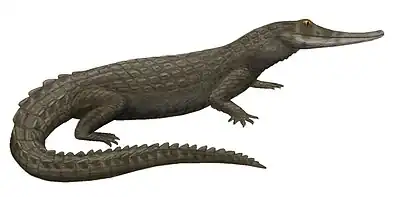Paralligatoridae
Paralligatoridae is an extinct family of neosuchian crocodyliforms that existed during the Jurassic and Cretaceous periods. It includes the genera Paralligator, Brillanceausuchus, Kansajsuchus, Shamosuchus, Scolomastax, Sabresuchus, Rugosuchus, Batrachomimus and Wannchampsus, as well as the yet-unnamed "Glen Rose form".[1][2]
| Paralligatoridae Temporal range: Late Jurassic - Late Cretaceous, | |
|---|---|
 | |
| Skulls of Paralligator | |
| Scientific classification | |
| Domain: | Eukaryota |
| Kingdom: | Animalia |
| Phylum: | Chordata |
| Class: | Reptilia |
| Clade: | Pseudosuchia |
| Clade: | Crocodylomorpha |
| Clade: | Neosuchia |
| Family: | †Paralligatoridae Konzhukova, 1954 |
| Genera | |
|
†Batrachomimus | |
Evolution
Phylogenetic analyses of crocodyliforms find Paralligatoridae to nest within Neosuchia, a large clade (evolutionary grouping) that also includes modern crocodylians. In crocodyliform phylogeny, paralligatorids are usually found near the base of Neosuchia, outside the clade Eusuchia, which includes crocodylians and their closest relatives. Below is a cladogram from Montefeltro et al. (2013) showing the phylogenetic relationships of Paralligatoridae:[1]
| Mesoeucrocodylia |
| ||||||||||||||||||||||||||||||||||||||||||||||||||||||||||||||||||||||||||||||||||||||||||
References
- Montefeltro, F. C.; Larsson, H. C. E.; de França, M. A. G.; Langer, M. C. (2013). "A new neosuchian with Asian affinities from the Jurassic of northeastern Brazil". Naturwissenschaften. 100 (9): 835–841. Bibcode:2013NW....100..835M. doi:10.1007/s00114-013-1083-9. PMID 23893176. S2CID 11705304.
- Thomas L. Adams (2014). "Small crocodyliform from the Lower Cretaceous (late Aptian) of central Texas and its systematic relationship to the evolution of Eusuchia". Journal of Paleontology. 88 (5): 1031–1049. doi:10.1666/12-089. S2CID 84776430.


